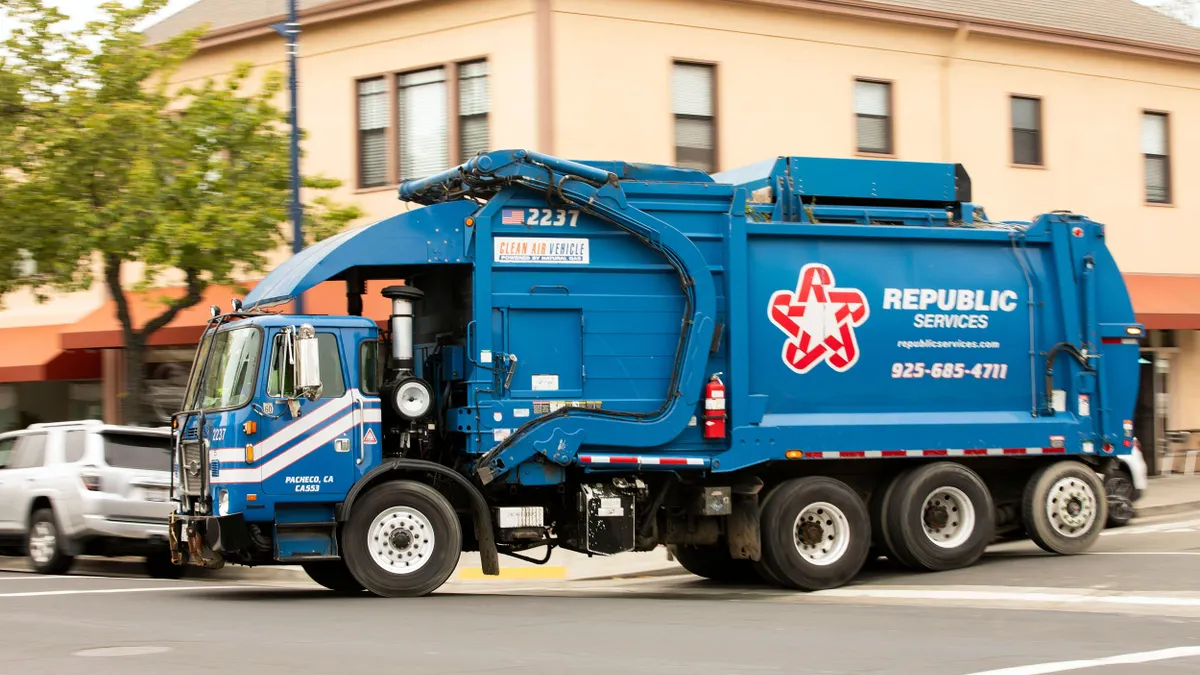Each morning, people across the world wake up to an alarm set by an app on their cell phone. They click through more apps to check the weather, check the train schedule, check the screening times of the movie they'll go to see after work. It's a modern day cycle; humans are becoming dependent on their devices to get them through the day, which is not surprising considering how technology has changed worldwide industries.
Yet, as the transportation world has been transformed by apps like Uber, or the banking world has been altered by Venmo and Mint, what technology is being developed for the world of waste and recycling?
Consumer convenience
As the need for consumer-friendly apps increases industry-wide, mobile technology is starting to change how companies in waste and recycling do business. New tools are enabling both corporate managers and the average waste and recycling consumer to take advantage of access to information on services, scheduling, and more, while helping them make wiser bottom-line decisions.
Additionally, whole municipalities are getting into the mix of trash and tech. In what could be a case study in responsive government, the city of Boston has promoted a customer app called Trash Day, designed by ReCollect Systems. Residents can get trash and recycling collection schedules through the app, which was developed in response to a flood of calls placed to the mayor’s hotline inquiring about trash pick-up scheduling.
Boston is not alone; other towns, such as Houston, TX, have also developed apps so users can save time and hassle in finding information they need on local trash pick-up. Similar to Boston’s Trash Day app, the Rollout! Houston iPhone app lets users input their location to get the recycling, yard waste, and trash schedules for that area. It even has an alarm setting for users to schedule reminders.
The app was a winning product of the third annual Houston Hackathon, which took place in May.
Tech in the field
IT firms also are seeing gold in the hills of trash being collected across the nation. In June, Plano, TX-based tech company FieldAware launched mobile tools for a number of industries, which enable companies to create checklists for things such as environmental compliance and scheduled work in the field. This is particularly helpful in the waste industry, because knowing where trucks are and how fast routes are being completed provides opportunities for greater efficiencies, said Lynn Jones, vice president of marketing for FieldAware.
The company's product is not simply a cloud-based tool, said Jones. “Ours is a true mobile application. It’s an application that’s actually running on a mobile device. A lot of workers need to be able to work entirely offline sometimes,” she said.
Although mobile tools are newly emerging, high-tech practices are nothing new for the waste and recycling industry. Tools such as DriveCam, which is widely used in trucks across the industry, allow companies to record a driver and the surrounding area when a truck is driving too fast, has a sudden stop, or is in other dangerous situations. This allows the company to keep drivers reliable, while keeping both employees and the public safe.
The instantaneous retrieval of data that’s inherent in computer-based business management solutions is also being used to better arrange scheduling of pick-ups by managers of waste hauler truck fleets.
“Mobile technology can make operations more productive by giving real-time information on the location of [a] truck and amount of waste in the truck,” said David Biderman, executive director and CEO of SWANA. “You can understand where the truck is and how full it is at any time.”
Now, a new tool aims to give a sort of "a la carte" approach to residential pick-ups, providing more choices for residents regarding when they have their trash taken away.
Innovative technology solutions
Founded in 2008, Rubicon Global has created a virtual place where smaller waste haulers can bid on and operate parts of large national hauling contracts. Rubicon doesn’t own a fleet, but it connects a network of smaller fleets with bigger ones, and makes revenue based upon the amount of money it saves clients and the amount of recyclables it sells for them.
Additionally, the company's new residential app allows users to schedule a pick-up from their smart phones, just as they would to schedule a pick-up with Uber. That’s no coincidence — the Rubicon app was mostly created by Oscar Salazar, the founding CTO of Uber.
“Rubicon provides an intriguing business model,” said Biderman, who mentioned that Rubicon's Co-Founder and CEO Nate Morris will be speaking at WasteCon on Aug. 26 in Orlando, FL.
The company wants to be a game-changer in waste and recycling, by changing the way others do business. Industry watchers will have to wait and see if such a lofty goal can be realized, but Morris is confident.
“Rubicon will revolutionize the industry by realigning the financial incentives away from landfilling and into more recycling opportunities,” Morris said. “In addition, Rubicon is empowering independent haulers and recyclers to compete with the two major national hauler companies. We are allowing small business to grow and win opportunities that they have been shut out from in the past.”

















